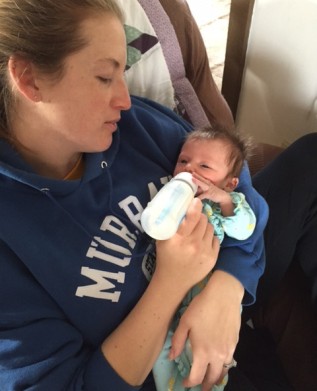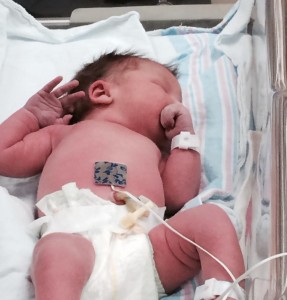While going through pregnancy, I was asked many times if I planned to breastfeed Baby A&W. It wasn’t even much of a conversation between M and I–it was up to me, and I figured it was the best thing to do. I had read articles saying how it helped keep allergies at bay and boost the immune system of the baby. Plus, let’s face it, I was all about the weight loss benefits.
I knew breastfeeding wasn’t going to be easy, and I’ve many stories from those who tried and couldn’t or tired and succeeded, but I still went into it kind of blind, thinking surely it’d be something that just came to you–like maternal instincts are supposed to do. But then Aubrey came along, and I was rocked into motherhood.
Aubrey was a bit of a “lazy nurser”–meaning she didn’t want to try very hard to nurse on me, and would fall asleep often. She was also a little jaundice and lost about a pound from her birth weight, so I was stressing. The pediatrician prescribed that I feed her every two hours, and to pump after each nursing. I was spending 1.5 hours feeding A every 2, between fighting her to nurse, then pumping, then feeding what I pumped to her to make sure she actually got nutrition. It was wearing me down. I wanted to go straight to bottle feeding and pumping, but our first pediatrician said to not do that for another three weeks.
We went to see a lactation specialist, who had taught our breastfeeding class we took a month before A was born. She was great–she spent 3 hours with us, helping to work on A’s latch, checking to see how many ounces she really was getting from me, and being a big support. Unlike some lactation consultants, she was OK with pumping and she said she expected that I would have to supplement with formula–and that was OK. But because the doctor wanted A strictly on breastmilk, she helped us form a plan (which was the feeding, pumping, bottle plan), gave me her personal cell phone number, and wished us luck.
I was feeling more and more depressed, and stressed, feeling like I was a horrible mother for starving my child. I was also exhausting myself with the hellacious schedule that it required. It was all a nasty cycle that just continued, and I felt like M was getting tired of dealing with my tears of exhaustion and frustration because he knew there wasn’t anything he could do to help, and he hated feeling helpless.
Thankfully, we had to see another pediatrician in the same practice due to scheduling for one of A’s follow-ups. Dr. W was a breath of fresh air. She admitted that breastfeeding was difficult for her with her two boys, and how she felt guilty because, after all, she was a health care professional and she couldn’t breastfeed. But she pumped, and supplemented with formula, and her boys turned out just fine. Her wise words of advice: “All that matters is that you’re feeding and nourishing your baby. How you do that doesn’t matter–whether it’s via breastfeeding, pumping and feeding via bottle, supplementing with formula, or using all formula. It’s all the same. Just get food into her.”
That was a turning point, and, thanks to support from my mom, who saw how beaten down I was (my phrase was “Mom, I feel like I’m a dairy cow, and that’s all I am right now.”), I turned to exclusively pumping and feeding A via a bottle, using Similac Supplemental to boost her ounces. Doing such helped her finally start to gain weight and really start growing.
Now that I’m back to work, things have changed even more so. I’m extremely thankful to have a boss who immediately went to work finding an empty room and making it a “Mothers’ Room” for me and any other mother looking for a place to pump in peace. However, I was also dealing with being somewhat of a “single mom” and had to figure out how to pump when A was still awake (pumping in the middle of the night or before she woke up was easy). Because of that, I had to start dropping pumpings because it just wasn’t feasible.

Feeding your child helps you bond, whether its via the breast or the bottle, and no one should make you feel horrible for choosing either way.
Now that she’s past the two month mark, and had her first set of shots, I’m feeling more comfortable with the fact that I’m already starting to dry up. I never was able to produce much in the first place–maybe 3 ounces (from both breasts) at a time–so I knew my time would be limited. However, it does make me sad that soon I won’t be able to provide my own nourishment to her, not to mention the idea of buying formula more often than I am now makes my bank account cry.
I feel selfish saying that I can’t wait until I’m done producing breast milk because then I can easily go workout or go for runs on a tight schedule (right now I have to pump for at least 30 minutes beforehand, which requires planning and balancing). I can also relish in an adult beverage or two, which I haven’t done since I discovered I was pregnant (sure I could “pump and dump,” but I barely make enough milk as it is, I felt like that would be a waste of “liquid gold.”). And I can get back to wearing normal bras and clothes that I don’t have to worry about being able to pull up easily to pump while at work. Even just typing this makes me feel like I’ll be judged.
But, truth is, I’m ready to have my body back to myself. I’ve been able to provide more than some mothers are able to, for some reason or another, so I should be proud of myself for at least being able to stick it out as long as I have. I really did give it a good college try, and I provided her with my nutrients the best I could. I can’t be like my co-worker who has a 15-month-old and still pumps 10 ounces once a day–most women aren’t built like that.
And I’m OK with that.
More reading:
Fit Pregnancy: It’s OK if You Can’t Breastfeed
The Lean Green Bean: Breastfeeding is Hard

